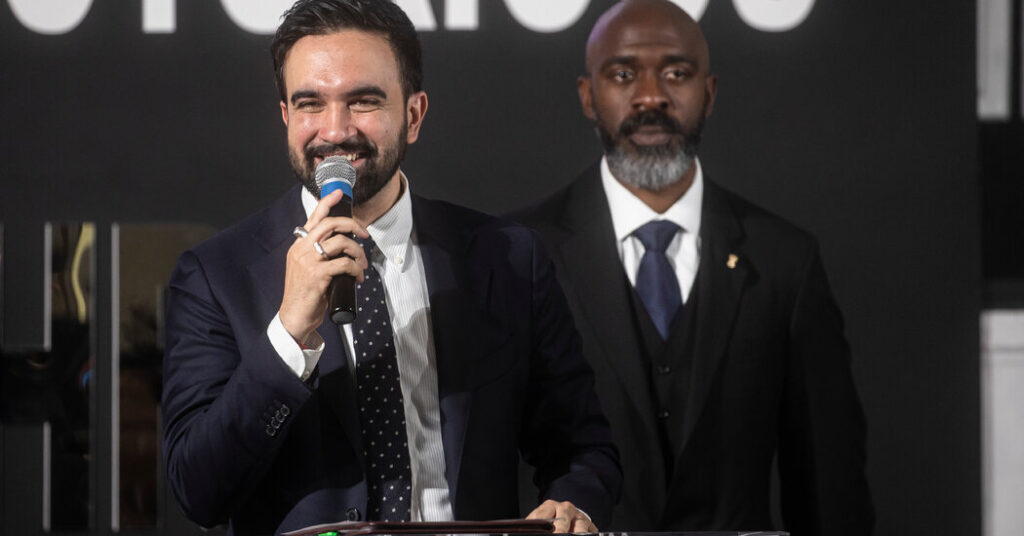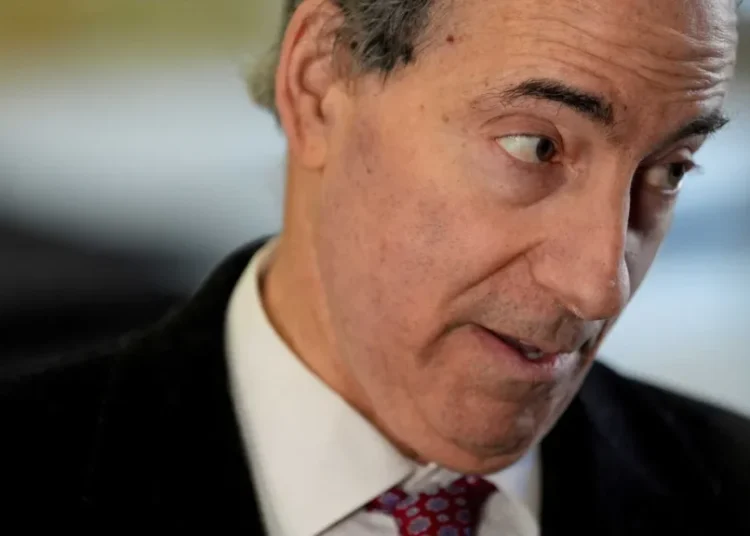Zohran Mamdani’s victory in New York’s mayoral election this month may have scrambled what had been a clear political imperative for candidates in the city: the need to support Israel.
In a number of congressional races across New York City, challengers are betting that the success of Mr. Mamdani — a vigorous critic of Israel’s treatment of Palestinians — portends a potential vulnerability for pro-Israel incumbents.
Representative Adriano Espaillat, a Democrat whose district includes Upper Manhattan and portions of the Bronx, is facing a primary challenge from Darializa Avila Chevalier, who helped lead protests against the Israel-Hamas war at Columbia University and has criticized Mr. Espaillat for supporting the sale of weapons to Israel and receiving donations from the American Israel Public Affairs Committee.
Representative Daniel Goldman, a Jewish Democrat representing parts of Brooklyn and Manhattan, seems headed to a primary battle, too. Councilwoman Alexa Avilés, a harsh critic of Israel, and the city comptroller, Brad Lander, who has attacked the Netanyahu government, have both signaled interest in running for his seat.
“There is no denying that U.S. taxpayer dollars are undergirding what is happening: the utter destruction of Gaza,” Ms. Avilés said in an interview. “You can now run for even higher office, as mayor of New York City, and say these things head-on.”
And in the Bronx, Representative Ritchie Torres, another firm ally of Israel, is being challenged by Michael Blake, a former state assemblyman who is trying to court voters opposed to Israel’s actions in its war against Hamas.
“I will invest in the community,” Mr. Blake said on social media when he announced his run. “Ritchie invests in bombs.”
The results of the mayor’s race showed that Jewish New Yorkers differed greatly in their opinions of Israel. Many of them are deeply ambivalent about the nation’s leader, Prime Minister Benjamin Netanyahu, but some still strongly support the country — especially in districts with dense pockets of Jewish voters.
Mr. Torres, who has received close to $1.2 million in support from AIPAC’s fund-raising arm since 2022, represents the poorest congressional district in America — but one that also includes more affluent portions of the Bronx like Riverdale and Spuyten Duyvil, which have large Orthodox Jewish populations.
Mr. Goldman and Mr. Espaillat also represent districts with substantial Jewish populations, according to research by the Jewish Electorate Institute. (Mr. Goldman’s district also includes large pockets of immigrant Muslim voters from Bangladesh and other countries.)
Mr. Mamdani won all three of these districts in November, picking up more than 52 percent of the vote in the area represented by Mr. Torres. In Mr. Goldman’s and Mr. Espaillat’s districts, Mr. Mamdani prevailed with more than 60 percent of the vote.
His success was driven by a range of factors, including his focus on affordability and his ability to energize young voters in numbers not seen before.
Still, polling suggests that Mr. Mamdani’s point of view on the Middle East is broadly shared. Recent surveys from The New York Times and Siena University showed that 44 percent of registered New York City voters sympathized more with Palestinians than with Israel, while 26 percent sympathized more with Israel. About 51 percent of voters also said that criticizing Israel was not inherently antisemitic — a point made by Mr. Mamdani, who often speaks about his desire to protect Jewish New Yorkers from antisemitism.
Rabbi Jeremy Kalmanofsky of Congregation Ansche Chesed, a Conservative synagogue in Manhattan, said that 2025 felt like the twilight of the 20th century when it came to the traditional racial and ethnic politics of New York City. For years, he said, there had been “non-Jewish politicians who have been great friends to the Jewish community and understand our rootedness here in New York and our vulnerabilities.”
“I hope that people like Ritchie Torres and Hakeem Jeffries are not the last liberal friends of Israel and friends of the Jews to be elected to Congress,” said Rabbi Kalmanofsky, who opposed Mr. Mamdani.
Mr. Lander, who was a vocal critic of Israel while running in the mayoral primary, has sought to stake out a position of criticizing Mr. Netanyahu strongly while also identifying as a Zionist who believes Israel should exist as a Jewish state.
As city comptroller, he chose not to repurchase Israeli government bonds that were part of the city’s pension funds and had matured. (The funds, according to news reports, still have existing investments of about $300 million in Israeli companies and real estate.)
Ms. Avilés has said she opposes a recently announced plan from Mr. Lander’s successor, Mark Levine, to reinvest in Israeli bonds. She has also called Israel’s conduct in Gaza a genocide and railed against AIPAC’s donations to Mr. Goldman.
In her response to an endorsement questionnaire from the New York City chapter of the Democratic Socialists of America, which was obtained by The New York Times, she wrote that the United States “needs to stop supporting colonialism, from San Juan to Gaza.”
Mr. Goldman, who was endorsed by J Street, a liberal pro-Israel group, has criticized Mr. Netanyahu’s government but remains a staunch supporter of Israel and has taken donations from AIPAC and accepted its endorsement.
“Israel’s right to safely and securely exist as a Jewish, democratic state is fundamental to Dan’s relationship with his Jewish faith,” said Simone Kanter, a spokesman for Mr. Goldman. “Asking Dan to renounce Israel because of its government’s indefensible actions is akin to asking him to renounce his faith”
So far Mr. Mamdani has not taken a position on any of the congressional challengers except for Mr. Lander, whom he has encouraged to run against Mr. Goldman. With Councilman Chi Ossé, who announced a challenge to Mr. Jeffries, the top House Democrat, he took a different stance, showing up at a recent D.S.A. meeting to argue that the organization should not endorse the councilman.
Mr. Ossé has attacked Mr. Jeffries for receiving AIPAC donations and voting in favor of military aid for Israel. Despite these positions, the D.S.A. electoral working group announced on Saturday that it would not back him in the Brooklyn district, a decision that the main organization is likely to follow. Mr. Ossé said that he was “definitely not running for Congress without the support of NYC-DSA.”
Even as Mr. Ossé appeared to exit the race, Mr. Espaillat and Representative Grace Meng, a Queens Democrat, drew attacks last week from challengers for accepting donations from groups like AIPAC.
Chuck Park, a former Foreign Service officer and local official who is challenging Ms. Meng, noted her past acceptance of AIPAC support as he criticized what he called her inattention to the district.
“I don’t like that she is beholden to a small set of huge donors, and that is one of those groups,” he said. “She is responding to big checks and big donors rather than the needs of voters in Queens.”
Matt Rey, a spokesman for Ms. Meng, called Mr. Park an opportunist who was ignoring how the congresswoman had been “delivering for immigrants, families and seniors.”
Mr. Blake, meanwhile, who is challenging Mr. Torres after losing to him in a 2020 primary and then placing near the bottom of the mayoral primary field this year, has undergone a complete refashioning of his position on Israel.
As recently as five years ago, Mr. Blake was seeking donations from AIPAC board members, writing in a memo to the organization about his strong support for military aid to Israel and proudly recounting trips he had taken there.
Adam Harris, an AIPAC spokesman, said Mr. Blake’s “180-degree reversal” surprised the group since he had spoken at pro-Israel events “and received considerable financial support from the community.”
Mr. Blake explained that his views had shifted during Israel’s invasion of Gaza, which before a cease-fire last month had killed tens of thousands of Palestinians and displaced even more.
“It’s no different than what we’ve seen in terms of people shifting as it relates to other conflicts, like the Iraq War,” he said, accusing Mr. Torres of focusing more on Israel than on his own district. Benny Stanislawski, a spokesman for Mr. Torres, disputed this, saying that the congressman had been “fighting to make sure the Bronx gets its fair share.”
Jeff Adelson, Emma G. Fitzsimmons and Maya King contributed reporting.
Benjamin Oreskes is a reporter covering New York State politics and government for The Times.
The post Challengers Take on N.Y. House Democrats, Targeting Their Ties to Israel appeared first on New York Times.




